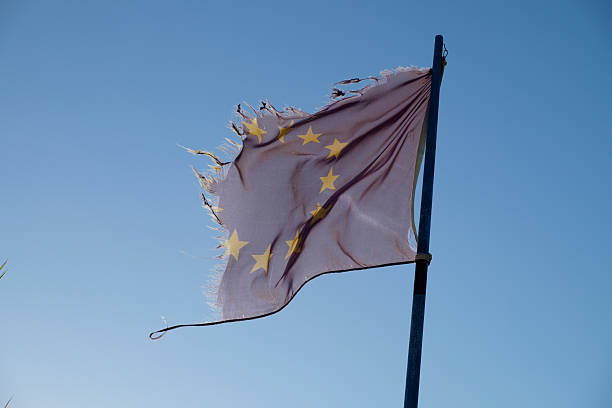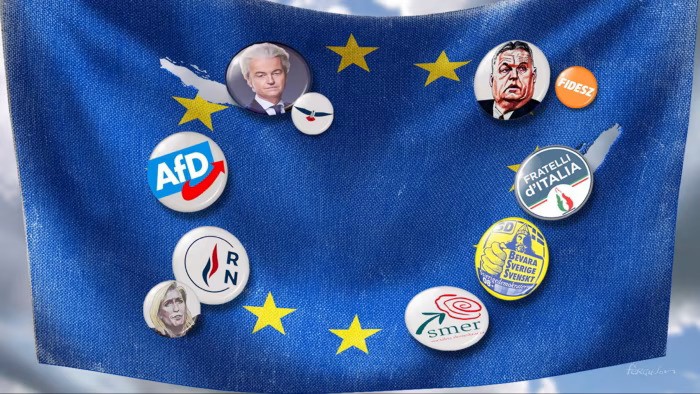Donald Trump and Elon Musk want to destabilize Europe. But Europe, which has been stalling since the turn of the century, is largely responsible for its ill-fated destiny.

17 January 2025 — Fortunately, Europeans have Elon Musk, who allows them to lie to themselves a little longer. Of course, Emmanuel Macron and his peers are right to denounce the “international reactionary organization” serving Donald Trump, who wants to destabilize political structures in Europe. But Musk’s obsession cannot mask two undoubtedly more disturbing realities.
Firstly, the Tesla, SpaceX and X boss is not alone: the whole of Trump’s America is sounding the death knell on Europe.
Secondly, it is Europe, in full stall since the turn of the century, that is largely responsible for its ill-fated destiny, and the collapse of the German model is the trigger.
That is, at least, the view of conservative America. “Nations prepare for a post-European world,” writes Wall Street Journal columnist Walter Russell Mead, noting that “Trump recognizes that the Continent has abdicated its role in history.” With an air of “I told you so,” the columnist details the U.S. assessment of Europe, economically unhinged, unable to keep the promises of its costly social model, destabilized by migration, driven out of Africa and at the mercy of Russia:
Under the circumstances, it’s easy to understand the schadenfreude with which much of the “Make American Great Again” world regards a weakened and demoralized Europe. The contempt with which Germany and the European establishment generally rejected President Trump’s correct and important criticisms of misguided European foreign and domestic policies still rankles.
Trump’s second term has not even begun, and the offensive is already underway, as evidenced by Apple boss Tim Cook and Meta founder Mark Zuckerberg who relentlessly denounce obstacles to entrepreneurial freedom in Europe. Artificial intelligence (AI) is too serious a matter for Americans to bow to European rules. Europe’s role in setting the global standard is over: It is too weak.
Europe lagging behind
Edward Conard, of the conservative American Enterprise Institute think tank, wrote in an article published in the Wall Street Journal entitled “Why the US economy is trouncing Europe’s”, that in 50 years, Europe has created 14 companies worth more than $10 billion (€9.8 billion). The Americans have created nearly 250 worth $30 trillion. Europe’s leading capitalization, the Danish pharmaceutical group Novo Nordisk, which sells its anti-obesity drugs to the US, ranks 25th in the world, followed by France’s LVMH (28th).
And the trend is set to continue. France has trained genius entrepreneurs who have launched an innovative AI project, Mistral AI. The start-up, which in June 2024 raised €600 million, was then valued at $6.2 billion. But OpenAI (Microsoft), Anthropic (Amazon) and xAI (Musk) have all raised more than $6 billion. They are worth between $157 billion for ChatGPT’s parent company and $50 billion for Tesla’s AI. These valuations ensure the financing of the colossal investments in AI, whether for Nvidia’s ultra-sophisticated chips or to meet its insatiable energy needs.
Here too, Europeans are caught off-guard. The U.S. has swung from the fight against global warming to championing AI, and is embarking on a mad race for energy, be it gas, solar, Texas turbines or nuclear. How can we keep pace in Europe with energy that is four times more expensive?
Faced with such a weakened Europe, Trump’s America wants to impose its own rules. The president-elect is demanding that everyone contribute 5% of their gross domestic product to the North Atlantic Treaty Organization (NATO); he is serious about getting his hands on Greenland, demands the purchase of Texan natural gas, and plans to break social and Christian-democratic models by promoting chainsaw solutions similar to those practiced by Argentina’s President Javier Milei, Musk’s role model. Quite simply, America is in the process of reviving the humiliating “unequal treaties” imposed in the 19th century by the West on a weakened China.

And politically? Well, Austria is set to install its first far-right chancellor (Herbert Kickl) since World War II. But for the EU it’s the “new normal”. And Kickl could prove even harder to handle within the EU than Hungary’s consistently obstructive Viktor Orbán.
When Austria’s Freedom party (FPÖ) entered government 25 years ago, shock waves reverberated around Europe. Punitive measures were imposed, diplomatic visits cancelled and Belgium even suggested the EU could do without the Alpine country.
That was when the far-right party was only a junior coalition partner. This time, the FPÖ – nativist, anti-immigration and fiercely critical of the EU – is in the driving seat, Herbert Kickl being its leader.
What’s more, Vienna will join an expanding bloc of disruptive, Moscow-friendly member states at the heart of Europe: Hungary’s Viktor Orbán (whom Kickl has hailed as a role model), Robert Fico in Slovakia and probably, after elections in October, Andrej Babiš of the Czech Republic. Marine Le Pen waits in the wings in France.
It is a measure of how far the far right has advanced in the EU that the reaction in Brussels and other capitals is little more than a shrug. Said a diplomat from the EU’s largest member: “We’re going to have to deal with it, aren’t we? It’s the new normal now”.
And as one EU insider told me:
Look, the EU red lines such as the rule of law, judicial independence, fundamental rights and respect for international law are not up for discussion, they are vanishing. Kickl said he wants an end to Brussel’s “red tape” and Brussel’s “political excesses. He also wants an immediate halt to immigration, the suspension of Austria’s asylum system and the expulsion of all asylum seekers – which would breach EU law. You saw it all in his party’s election manifesto which was titled “Fortress Austria, Fortress of Freedom”.
Some also note that if Kickl is not held in check by his centre-right partners, he could prove even harder to handle within the bloc than the consistently obstructive Orbán, who has been kept more or less onside largely through withholding EU funds.
Why? Unlike Hungary, Austria pays more into the EU than it gets out, so it might not be amenable to a transactional approach. Kickl could fall in line. Or he could go rogue. The fact is, no one knows.
If Kickl, Orbán and their fellow disruptors do unite, EU policies – especially those that need unanimity – will suffer.
And that’s the thing. Far-right parties now lead governments in Italy, Hungary and Slovakia, and are members of, or support coalitions in the Netherlands, Finland, Sweden and Croatia. Besides Austria, they are also pushing at the door in Romania, the Czech Republic and France.
Even so, anti-EU governments will remain well short of the blocking minority in the European Council needed to seriously upset EU decision-making.
Yes. But … all eyes will be on centre-right parties’ readiness to cut deals on their right.
That famous firewall, the “cordon sanitaire“, which once kept populist groups out of power is well and truly dead.